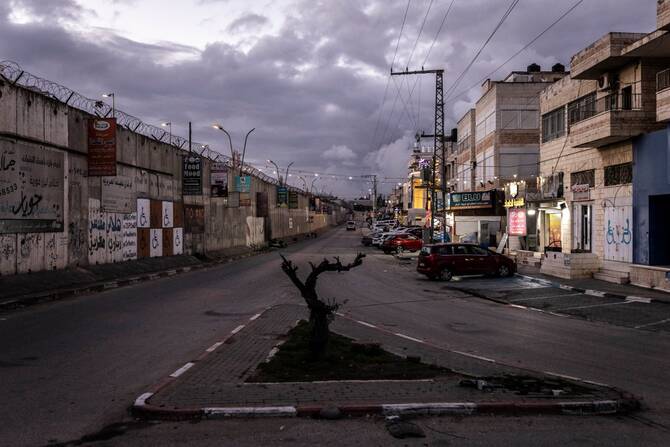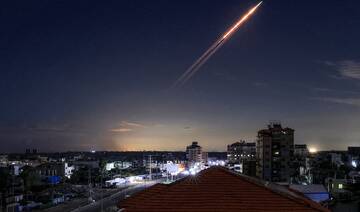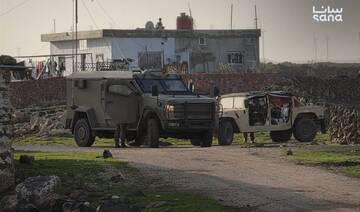AL-MUKALLA: Yemen’s Houthi militia launched an anti-ship ballistic missile into the Red Sea on Saturday morning, striking an oil tanker traveling from Russia to China, according to US Central Command, the latest in a series of Houthi maritime strikes.
CENTCOM said that at 1 a.m. on Saturday, a Houthi anti-ship ballistic missile struck a Panamanian-flagged, Greek-owned and operated oil tanker named M/T Wind, which had just visited Russia and was on its way to China, causing “flooding which resulted in the loss of propulsion and steering.”
Slamming the Houthis for attacking ships, the US military said: “The crew of M/T Wind was able to restore propulsion and steering, and no casualties were reported. M/T Wind resumed its course under its power. This continued malign and reckless behavior by the Iranian-backed Houthis threatens regional stability and endangers the lives of mariners across the Red Sea and Gulf of Aden.”
Earlier on Saturday, two UK naval agencies said that a ship sailing in the Red Sea suffered minor damage after being hit by an item thought to be a missile launched by Yemen’s Houthi militia from an area under their control.
The UK Maritime Trade Operations, which monitors ship attacks, said on Saturday morning that it received an alarm from a ship master about an “unknown object” striking the ship’s port quarter, 98 miles south of Hodeidah, inflicting minor damage.
“The vessel and crew are safe and continuing to its next port of call,” UKMTO said in its notice about the incident, encouraging ships in the Red Sea to exercise caution and report any incidents.
Hours earlier, the same UK maritime agency stated that the assault happened 76 nautical miles northwest of Hodeidah.
Ambrey, a UK security firm, also reported receiving information regarding a missile strike on a crude oil tanker traveling under the Panama flag, around 10 nautical miles southwest of Yemen’s government-controlled town of Mokha on the Red Sea, which resulted in a fire on the ship.
The Houthis did not claim responsibility for fresh ship strikes on Saturday, although they generally do so days after the attack.
Since November, the Houthis have seized a commercial ship, sunk another, and claimed to have fired hundreds of ballistic missiles at international commercial and naval ships in the Gulf of Aden, Bab Al-Mandab Strait, and Red Sea in what the Yemeni militia claims is support for the Palestinian people.
The Houthis claim that they solely strike Israel-linked ships and those traveling or transporting products to Israel in order to pressure the latter to cease its war in Gaza.
The US responded to the Houthi attacks by branding them as terrorists, forming a coalition of marine task forces to safeguard ships, and unleashing hundreds of strikes on Houthi sites in Yemen.
Local and international environmentalists have long warned that Houthi attacks on ships carrying fuel or other chemicals might lead to an environmental calamity near Yemen’s coast.
The early warning came in February when the Houthis launched a missile that seriously damaged the MV Rubymar, a Belize-flagged and Lebanese-operated ship carrying 22,000 tonnes of ammonium phosphate-sulfate NPS fertilizer and more than 200 tonnes of fuel while cruising in the Red Sea.
The Houthis have defied demands for de-escalation in the Red Sea and continue to organize massive rallies in regions under their control to express support for their campaign. On Friday, thousands of Houthi sympathizers took to the streets of Sanaa, Saada, and other cities under their control to show their support for the war on ships.
The Houthis shouted in unison, “We have no red line, and what’s coming is far worse,” as they raised the Palestinian and militia flags in Al-Sabeen Square on Friday, repeating their leader’s promise to intensify assaults on ships.
Meanwhile, a Yemeni government soldier was killed and another was injured on Saturday while fending off a Houthi attack on their position near the border between the provinces of Taiz and Lahj.
According to local media, the Houthis attacked the government’s Nation’s Shield Forces in the contested Hayfan district of Taiz province, attempting to capture control of additional territory.
The Houthis were forced to stop their attack after encountering tough resistance from government troops.
The attack occurred a day after the Nation’s Shield Forces sent dozens of armed vehicles and personnel to the same locations to boost their forces and repel Houthi attacks.














